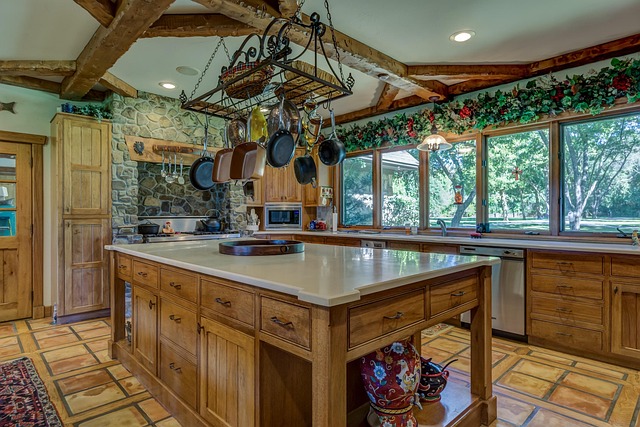The kitchen is undergoing a sustainable transformation, driven by environmental awareness. Bamboo countertops, recycled materials, and LED low-energy lighting are popular choices. These eco-friendly options reduce carbon footprints, promote healthier living, and showcase a commitment to preserving the planet. Installation and maintenance tips include using mild cleaners for bamboo and sealing/polishing recycled countertops, while incorporating energy-efficient LED lights further enhances sustainability and saves on utility bills.
The kitchen, the heart of many homes, is undergoing a sustainable revolution. As consumers become more eco-conscious, the demand for environmentally friendly kitchen solutions is on the rise. This article explores the trend towards sustainable kitchens, focusing on bamboo and recycled countertops—durable, natural alternatives to traditional materials. We also delve into the benefits of low-energy lighting, offering a comprehensive guide to transforming your space while reducing your environmental footprint.
The Rise of Sustainable Kitchens: A Need for Change
The kitchen, historically a heart of homes and communities, is undergoing a quiet revolution as we prioritize sustainability. In today’s eco-conscious era, homeowners and designers are increasingly seeking ways to make their kitchens more environmentally friendly without compromising aesthetics or functionality. This shift is driven by a growing awareness of the significant environmental impact of traditional kitchen construction and appliances. Materials like bamboo and recycled countertops offer not just a stylish alternative but also a pathway towards reducing our carbon footprint.
This trend extends beyond materials to energy-efficient practices, with low-energy lighting for kitchens becoming a popular choice. Such lighting options not only help reduce electricity bills but also contribute to creating healthier living spaces by minimizing exposure to harsh artificial lights. The integration of sustainable features in kitchens is not merely a passing fad; it represents a fundamental change in how we think about and design our spaces, reflecting a deeper commitment to preserving our planet for future generations.
Bamboo and Recycled Countertops: Exploring Eco-Friendly Options
Bamboo and recycled materials are emerging as popular choices for countertops, offering both style and sustainability in modern kitchens. This shift towards eco-friendly options is a refreshing trend, especially when considering the environmental impact of traditional countertop materials. Bamboo, known for its rapid growth, is not only visually appealing but also an incredibly durable resource. Its natural strength makes it a viable alternative to stone or wood, reducing the carbon footprint associated with extraction and processing.
Recycled countertops, on the other hand, transform post-consumer waste into stylish surfaces. By utilizing recycled glass, metal, or plastic, these materials not only divert waste from landfills but also significantly decrease the energy required for production compared to virgin resources. Moreover, low-energy lighting for kitchens can complement these sustainable countertops, further enhancing their environmental benefits and creating an energy-efficient cooking space.
Low-Energy Lighting: Illuminating the Path to Sustainability
Low-energy lighting is a simple yet powerful way to bring sustainability into your kitchen design, offering both environmental and financial benefits. By opting for energy-efficient bulbs and fixtures, you’re making a significant step towards reducing your carbon footprint. LED lights, in particular, are renowned for their long lifespan and low power consumption, making them an excellent choice for kitchens where lighting is often left on for extended periods.
Incorporating low-energy lighting solutions can enhance the overall aesthetic of your space while ensuring you stay within budget. Modern designs offer sleek and stylish fixtures that complement any kitchen theme, from rustic to contemporary. Moreover, these lighting options can be easily integrated into sustainable home automation systems, allowing you to control and optimize light usage, further maximizing energy savings in your kitchen.
Benefits of Using Eco-Conscious Materials in Your Kitchen Redesign
When redesigning your kitchen, opting for eco-conscious materials like bamboo or recycled countertops offers numerous advantages. These sustainable choices significantly reduce your environmental footprint, as they are typically sourced from renewable and rapidly regenerating resources. Bamboo, for instance, is a highly efficient crop that can grow quickly, making it an excellent alternative to traditional solid wood.
Moreover, incorporating low-energy lighting for kitchens in conjunction with these materials further enhances the eco-friendly aspect. Energy-efficient LED lights not only lower your utility bills but also contribute to a healthier indoor environment by reducing heat generation and electromagnetic radiation. This combination of sustainable materials and low-energy fixtures creates a harmonious space that is kind to both your wallet and the planet, ensuring a brighter, greener future for all.
Installation and Maintenance: Making the Switch Work for You
Switching to sustainable materials like bamboo or recycled countertops is an eco-friendly decision, but it also requires thoughtful installation and maintenance to ensure a successful transition. When incorporating these materials into your kitchen design, consider low-energy lighting options for kitchens, such as LED bulbs, which not only reduce energy consumption but also minimize heat output, keeping your space cooler and more comfortable.
Regular cleaning and care are essential for maintaining the longevity of sustainable countertops. For bamboo, use mild, non-abrasive cleaners to avoid damaging its natural fibers. Recycled countertops, while durable, may still require specific maintenance routines to keep them looking their best. Regular sealing and polishing can protect against stains and water damage, ensuring your new countertops remain in top condition for years to come.
In conclusion, embracing sustainable materials like bamboo and recycled countertops, coupled with energy-efficient solutions like low-energy lighting, marks a significant step towards creating eco-conscious kitchens. These choices not only reduce environmental impact but also offer long-term benefits in terms of durability and aesthetics. By integrating these practices into kitchen redesigns, we can contribute to a greener future, ensuring both functionality and a harmonious blend with nature.
